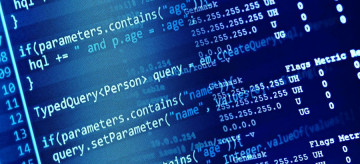- Advertising
- Bare Metal
- Bare Metal Cloud
- Benchmarks
- Big Data Benchmarks
- Big Data Experts Interviews
- Big Data Technologies
- Big Data Use Cases
- Big Data Week
- Cloud
- Data Lake as a Service
- Databases
- Dedicated Servers
- Disaster Recovery
- Features
- Fun
- GoTech World
- Hadoop
- Healthcare
- Industry Standards
- Insurance
- Linux
- News
- NoSQL
- Online Retail
- People of Bigstep
- Performance for Big Data Apps
- Press
- Press Corner
- Security
- Tech Trends
- Tutorial
- What is Big Data
Music and Artificial Intelligence
Artificial Intelligence is far from being able to make music, farther than most people presume anyway. However, this does not make Big Data with Machine Learning useless for musicians. This article explores some of the doors that big data technologies are opening for people working in the music industry.

Artificial Intelligence is far from being able to make music, farther than most people presume anyway. However, this does not make Big Data with Machine Learning useless for musicians. This article explores some of the doors that big data technologies are opening for people working in the music industry.
Shaking & Stirring the Fake News
Every once in a while you see a clickbait headline like “Music is dead. Soppi software killed music.” The newer version of this headline titles “Artificial Intelligence has just produced an EDM hit song. Soppi is a robot that…”
Soppi usually exists, only that the melodies were either written by musicians or taken from a database of previously written songs. Soppi may just select ready-made samples from a sample database, samples already arranged by musicians so that they work well with each other. Somebody sings on top of the song and guess what, Soppi did not write the vocals, nor the lyrics.
In the end the song our fictional robot Soppi wrote goes to mixing and then mastering, and still doesn’t sound good.
No, machine learning does not write music, nor does it write lyrics, because machine learning does not actually think or feel, it just processes more data faster than normal algorithms, but it is far away from undertaking art forms that fully resonate within the human psyche, or soul, or whatever you prefer to call it.
So is it of any use then?
There are some uses I can picture for a machine-enhanced musician. I will focus on music production first and address other parts of the music industry later.
Big Data & ML for Musicians
Even if ML does not write music itself, the predicting capabilities of machine learning can be of great use to a musician. Learning patterns is what ML does best, so it can suggest a chain of effects based on your previous use of that software. If you say no, it can suggest another. In time, it could suggest matching drums or hats, making your life as a musician that works with millions of samples and effects way easier.
A lazy musician would only rely on predictions in time, but some already do that now with presets and samples anyway, while a talented musician could improve both the quality of his work and the output by being enhanced by machine learning.
After the song or album is finished, big data with machine learning can run sentiment analysis on social media and receive precious feedback from people. It could suggest choosing a single from the album or it can just report the feedback back to the musician. Receiving feedback is a valuable resource for a musician because making music is a repetitive process where you keep listening to the same melody or chunk of a track over and over again and you may become oblivious to some flaws. These very flaws may be the savor of a certain song, but it can also kill many songs.
Most musicians are forced to promote themselves their whole career unless they reach a level where they have a management team to do that for them. This is cumbersome and takes precious time that could be otherwise spent making music. Big data with machine learning can help the artist run nice marketing campaigns cheaper, promote his events and make his music heard, which takes us to:
Event Promoters
Smaller promoters just book artists they feel people want to see, others book artists because they like them, while bigger promoters usually just host events with expensive names of the industry. By running big data analysis and predictions you may be able to get more people with less expensive artists, get better deals, reduce costs, and improve the experience and the safety of your events.
Whether a small or a bigger promoter, getting people to your club or venues is crucial. You usually post official photos and materials, some bio of the artist, and some of his songs. But how are you making sure that what you choose to post is what your audience wants to see or what will attract a bigger audience? Are you even sure that the artist you have booked that has over 500,000 likes on Facebook is actually wanted or even known in your area?
Finding out first if the artist you are about to book may turn into a flop before you lose all your money is the smart approach, and gets you ahead of your competition. Each time you give free passes you could collect data, make a card, so you can collect data even when people buy drinks. That card makes people feel part of a community and you also give them discounts for using your card.
Process that data to find out where the bottlenecks are in your bar, what more drinks to order, how people feel about a certain performer, and even overall feedback on your brand of events. Use sentiment analysis to learn from your social media pages and connect it to the info from your card through Facebook, Twitter, and Instagram.
Record Labels & Distributors
Major labels are already employing big data analysis on their business helping them increase their rooster of artists, choose singles from albums and which video to publish, improve promotion and their social media engagement.
Smaller labels think they are too small to have any use for big data or machine learning, but these are valuable growing tools. With big data you pay for what you use and having less data to process will also cost you less, so you can afford to use the new technologies and grow organically.
Using big data is already a must for music distributors because they handle millions of songs each month. Keeping track of the labels they distribute and choosing which to drop is quite difficult a task, but having so many sales with figures and charts on each track must be harnessed.
Conclusion
We have all witnessed the power of big data and machine learning in music with Spotify, which gained a huge user base by creatively using these technologies to suggest similar artists and songs based on people’s previous listens.
The same can happen for your brand of events, your record label, and soon for the music you are producing as a musician. Big data seems another thing to worry about at first, but after using it to base your business decisions or to enhance and speed up the process of making music, it becomes a natural part of how you conduct your profession.
However, we have to be careful to still follow our gut feelings because solely relying on this enhanced way of doing things will cut creativity and innovation.
Readers also enjoyed:

Leave a Reply
Your email address will not be published.